

Theogony. Theomachy. Theomachy in Greek (/θiˈɒməki/; Greek: θεοί = gods + μάχη = battle) means battle of the gods.
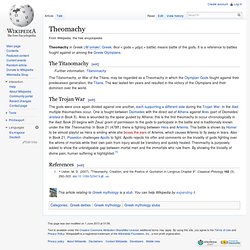
It is a reference to battles fought against or among the Greek Olympians. Fomorians. Celtic polytheism. Celtic polytheism, commonly known as Celtic paganism,[1][2][3] comprises the religious beliefs and practices adhered to by the Iron Age peoples of Western Europe now known as the Celts, roughly between 500 BCE and 500 CE, spanning the La Tène period and the Roman era, and in the case of the Insular Celts the British and Irish Iron Age.
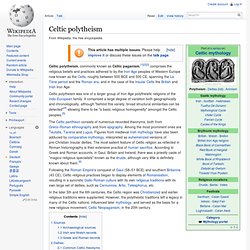
Celtic polytheism was one of a larger group of Iron Age polytheistic religions of the Indo-European family. It comprised a large degree of variation both geographically and chronologically, although "behind this variety, broad structural similarities can be detected"[4] allowing there to be "a basic religious homogeneity" amongst the Celtic peoples.[5] The Celtic pantheon consists of numerous recorded theonyms, both from Greco-Roman ethnography and from epigraphy. Among the most prominent ones are Teutatis, Taranis and Lugus. Asura. Accounts[edit] In early Vedic texts, both suras and asuras were deities who constantly competed with each other, some bearing both designations at the same time.
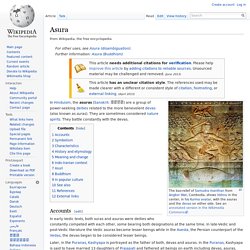
Deva (Hinduism) Deva (देव in Devanagari script) is the Sanskrit word for deity, its related feminine term is devi.
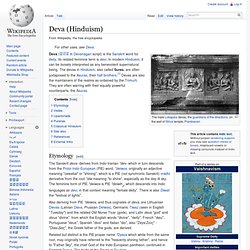
In modern Hinduism, it can be loosely interpreted as any benevolent supernatural being. The devas in Hinduism, also called Suras, are often juxtaposed to the Asuras, their half brothers.[1] Devas are also the maintainers of the realms as ordained by the Trimurti. They are often warring with their equally powerful counterparts, the Asuras. The Sanskrit deva- derives from Indo-Iranian *dev- which in turn descends from the Proto-Indo-European (PIE) word, *deiwos, originally an adjective meaning "celestial" or "shining", which is a PIE (not synchronic Sanskrit) vrddhi derivative from the root *diw meaning "to shine", especially as the day-lit sky. The feminine form of PIE *deiwos is PIE *deiwih2, which descends into Indic languages as devi, in that context meaning "female deity". Titan (mythology) The Titans were overthrown by a race of younger gods, the Olympians, in the Titanomachy ("War of the Titans").
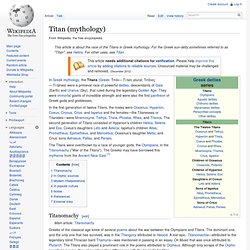
The Greeks may have borrowed this mytheme from the Ancient Near East.[1] Greeks of the classical age knew of several poems about the war between the Olympians and Titans. The dominant one, and the only one that has survived, was in the Theogony attributed to Hesiod. A lost epic, Titanomachia—attributed to the legendary blind Thracian bard Thamyris—was mentioned in passing in an essay On Music that was once attributed to Plutarch. The Titans also played a prominent role in the poems attributed to Orpheus. Another myth concerning the Titans that is not in Hesiod revolves around Dionysus. Some scholars of the past century or so, including Jane Ellen Harrison, have argued that an initiatory or shamanic ritual underlies the myth of Dionysus' dismemberment and cannibalism by the Titans.
Many professional and amateur sports teams use a titan as their mascot. Twelve Olympians. Major deities of the Greek pantheon Fragment of a Hellenisticrelief (1st century BC–1st century AD) depicting the twelve Olympians carrying their attributes in procession; from left to right, Hestia (scepter), Hermes (winged cap and staff), Aphrodite (veiled), Ares (helmet and spear), Demeter (scepter and wheat sheaf), Hephaestus (staff), Hera (scepter), Poseidon (trident), Athena (owl and helmet), Zeus (thunderbolt and staff), Artemis (bow and quiver), Apollo (lyre), from the Walters Art Museum.[1] Although Hades was a major ancient Greek god, and was the brother of the first generation of Olympians (Zeus, Poseidon, Hera, Demeter, and Hestia), his realm was the underworld, far from Olympus, and thus was not usually considered to be one of the Olympians.
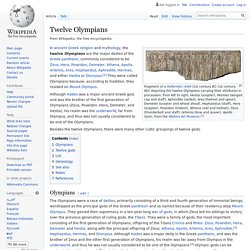
Besides the twelve Olympians, there were many other cultic groupings of twelve gods. Olympians[edit] Twelve gods[edit] List[edit] There is no single canonical list of the twelve Olympian gods. Genealogy[edit] Titanomachy. Prior events[edit] "...so soon as he had cut off the members with flint and cast them from the land into the surging sea, they were swept away over the main a long time: and a white foam spread around them from the immortal flesh, and in it there grew a maiden...
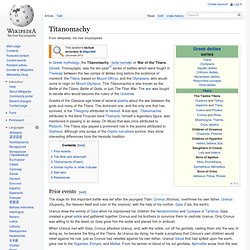
"[2] Cronus took his father's throne after dispatching Uranus.